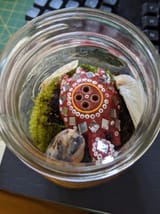"something for which electronics has no language"

(citation: title phrase borrowed from Murray Bookchin's Utopia not futurism lecture, 1978)
Hello friends,
How are you this eclipse week? I am wrapping up a Creative writing through reading class I've been taking, and preparing for a short workshop I'm offering on Neurodiversity at work with a partner organization. The snow and ice are slowly melting away, and the sun is re-enchanting me as spring rolls around.
This week I wanted to share with you a poem I read at an open mic in November 2024 at the Draft Reading Series. It was an honour to read alongside this fabulous and diverse group of writers and poets. I received the video from the Draft team recently, I've linked to the timestamp when my reading starts, it's five minutes long!
Open mic at Draft Reading Series online, Nov 2024. Kadir reads at 46:00 mins
I leave you with links to my sources and inspirations for this poem, Dreaming an alternate past for the futurist manifesto:
I worked on this poem at a poetry class I took last year facilitated by Tyler Pennock at university of guelph continuing education. We read Billy Ray Belcourt’s blackout poem Treaty 8 in his collection NDN Coping Mechanisms in this class, which inspired this work where I erase parts of the incendiary manifesto of futurism to reveal another story, another possible reality.
I came across The Futurist Manifesto while flipping through magazines in my bookshelf feeling my way into a seed for a writing prompt. In an essay by Sarah Scott in Culturala magazine’s first print issue, Disappearance, I spotted it, and went down the wikipedia link rabbit hole and here we are!
The Futurist Manifesto, (Italian: Manifesto del Futurismo) was written by the Italian poet Filippo Tommaso Marinetti and published in 1909. Marinetti expresses an artistic philosophy called Futurism that was a rejection of the past and a celebration of speed, machinery, violence, youth and industry. It also advocated for the modernization and cultural rejuvenation of Italy.
As I delved into Futurism and read the Manifesto, I was struck by the emphasis and passion for industrialization, speed, growth, with a simultaneous disdain for the past, and a desire to dominate the earth — All forces we deal with in this settler colonial late stage capitalist dystopia we are in, then and now, over a century later. It told me a story of the power of art and poetry to move people into action, and the great responsibility that comes with it.
- When Futurism led to Fascism, and why it could happen again
- More on futurism and it’s artists
- Full translated text of the Manifesto in English
After I worked on this, I read this lecture Murray Bookchin gave, at the Toward Tomorrow Fair in Amherst, Massachusetts, on August 24, 1978, called "Utopia, not Futurism: Why doing the impossible is the most rational thing we can do". It was shared by Toi Smith in their newsletter series The Deepening. I love when my universe keeps bringing me back to themes that I have become recently obsessed with! I highly recommend reading the whole lecture, I love how he talks about the language we use that comes from the world of electronics:
We’re beginning to develop a language which has nothing whatever in common with ecology. It has a lot to do with electronics. We talk of input. ‘Give me your input. Plug in!’ [laughter] Well, I don’t ‘plug in’, I discuss [applause]. Machines ‘plug in’. Radar is the language that produced it and the military is the language that produced the words ‘plug in’.
‘Give me your input’. That is not what I want. I don’t want your output, I want you. I want to hear your words. I want to hear your language. I’m not engaged in ‘feedback’ with you [laughter], I’m engaged in a dialogue, a discussion. It isn’t your ‘feedback’ I want, I want your opinion. I want to know what you think. I don’t want to have a circuit plugged into me where I can get your ‘feedback’ and you can get my ‘input’. [laughter]
...
Please, I’m making a plea here, and if you think I’m talking about language, I think you would be wrong. I’m not talking about language, I’m talking about sensibility. A plant does not have ‘input’ or ‘output’. It does something for which electronics has absolutely no language—it grows! It grows! [applause]. And let me tell you another thing, it not only grows, it does more than change; it develops.
— Murray Bookchin, Utopia not futurism lecture, 1978
That's all for this week folks, take it easy, and I'll see you next week <3




